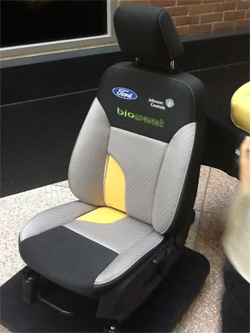The words “plastic,” “polymers,” and “environmental responsibility” rarely bump consonants in the same sentence, but public sentiment and keen competition can nudge a company into exploring all kinds of plastic substitutes. Of course, a $160 price tag on a barrel of oil is also rather compelling. So much so that the oil price shock of 2007, which saw prices climb to those astounding heights, breathed new life into Henry Ford’s original vision of “growing” automobiles.
|
ADVERTISEMENT |
Within a year of the oil price spike, one of Ford’s first green engineering wonders rolled off production lines: soy-based foam tucked into the seats of the 2008 Ford Mustang.

…
Add new comment